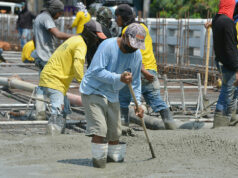BPOs reject work-safety claims after Cebu quake

By Justine Irish D. Tabile, Reporter
THE information technology and business process management (IT-BPM) industry association said companies accused of forcing their employers to work in the days after the Cebu earthquake should not have been named without prior investigation.
The IT and Business Process Association of the Philippines (IBPAP) said allegations about their treatment of workers have the potential to deter foreign investment in the industry.
In a statement on Thursday, IBPAP said it “denounces this irresponsible declaration by the Department of Labor and Employment (DoLE) Region VII, which prematurely named companies without the benefit of impartial investigation or validation,” it said.
Asked to comment, Labor Secretary Bienvenido E. Laguesma said via Viber that according to his conversations with DoLE Region VII, the regional director “never mentioned any company names in the Senate hearing but only mentioned the number of companies.”
“In any case, let me stress that it is not and will never be a DoLE policy to put on the spot (or) embarrass any company complained of whatever the sector it belongs without the benefit of an impartial investigation.”
He said DoLE will conduct further verification of these IBPAP concerns.
IBPAP said “the reckless naming of companies before the Senate and in the media damages reputations, caused confusion among employees, and created undue alarm among global clients whose confidence directly impacts investment, business continuity, retention, and creation of jobs in the Philippines,” it added.
IBPAP said that international clients may end up perceiving the Philippines as unreliable, inconsistent, and non-compliant in its labor practices.
“Such perceptions erode confidence, drive business to competing destinations, and jeopardize the very jobs and revenue the Philippine IT-BPM industry has worked hard to secure,” it said.
“Equally concerning, clients may become hesitant to expand outside Metro Manila, undermining countryside development opportunities where these jobs are most needed and where DoLE itself aims to create and safeguard livelihoods,” it added.
The group said it has not received documentation from DoLE regarding allegations made by the BPO Industry Employee Network (BIEN), whose members had alleged that workers in business process outsourcing (BPO) jobs in Cebu were not allowed to leave work despite safety concerns, and were not provided leeway to attend to families that may have been affected by the quake in the north of Cebu island.
The quake hit on the evening of Sept. 30, during the BPO night shift, a time when the industry typically services clients in Europe and the US.
Four of the six companies allegedly named were IBPAP members, with the association saying it failed to confirm reports that employees were prevented from leaving their offices.
“The findings from our inquiry disprove BIEN’s claims of widespread employee safety violations among IT-BPM employers during the Cebu earthquake,” IBPAP said.
It accused the regional DoLE office of bias after its inspectors were accompanied by BIEN members, who it described as “highly biased… against IT-BPM employers.
Meanwhile, BIEN cited “evacuation failures” in the wake of the 6.9-magnitude earthquake, claiming that “workers (were) forced to return to their stations while aftershocks continued. These are not rumors. They are documented incidents, supported by workers’ testimonies, photos, videos, and reports from multiple Cebu BPO sites.”
“IBPAP’s assertion that there were no confirmed incidents ignores a long history of OSH (occupational safety and health) violations in the BPO sector, including tragic cases like the 2017 Davao fire, where 38 BPO employees lost their lives because of several safety failures,” it added. — with Chloe Mari A. Hufana



